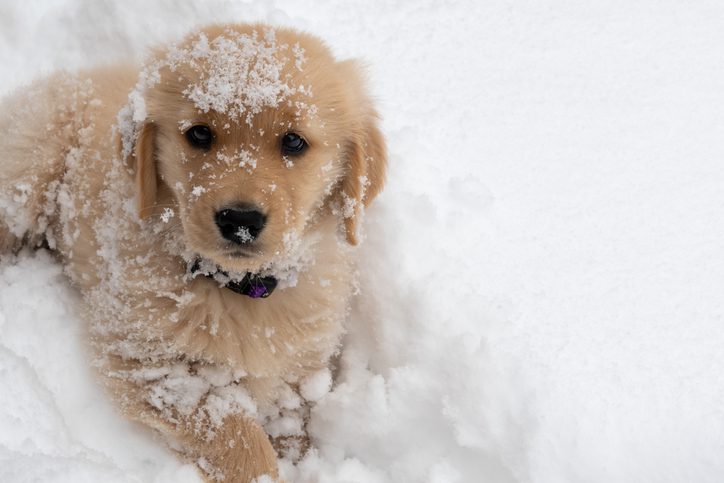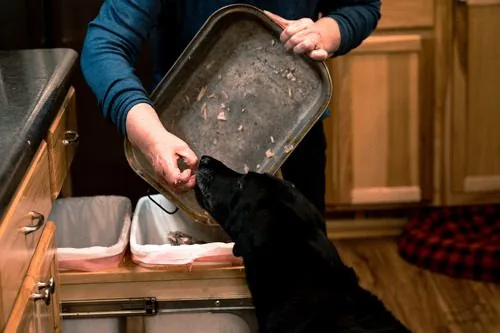Are you a dog owner who lives in a colder climate? Are you concerned about the risk of frostbite in your pet? Can dogs even get frostbite, or is this a problem that doesn’t happen to animals with furry coats?
The short answer is that yes, dogs can get frostbite. Some dogs are at a much higher risk of frostbite than others, but all dogs have the chance to suffer from this condition under the right circumstances. In the article below, we’ll help you learn more about the risks and symptoms of frostbite so you can know what to look out for in your pet.

Risks of Frostbite in Dogs
There are many risks that would increase your dog’s chances of getting frostbite.
Cold, Wet Climate
If you live in a climate where the weather turns cold and wet during the winter months, then your dog is already at an increased risk of frostbite. This type of weather is often related to frostbite in dogs and humans both, so take precautions when going outside in the winter.
Long-Term Exposure to the Elements
The longer your dog stays outside without supervision and without a dry, warm place to stay, the more likely they will be to risk frostbite. Your dog should always have access to a warm and dry location, even if they are spending some of the time in the backyard without supervision.
Age
Older dogs who have circulatory and breathing trouble may be more likely to risk frostbite than younger, healthier dogs. Respiratory and circulatory issues contribute significantly to colder extremities, which in turn lead to frostbite when dogs spend too much time outside on cold days. Keep your aging dog inside when the weather turns cold.
Underlying Health Problems
Dogs who have heart disease and diabetes may be at a higher risk of frostbite as well. Since they also do not get as much blood flow to their extremities, they are at risk of developing a wide variety of conditions that affect these parts of the body, including frostbite.
Short-Haired or Hairless Breeds
It may go without saying, but hairless dogs and those with very short, fine coats are more likely to suffer from frostbite anywhere on the body, and not just on the paw pads or ears. However, any dog can experience frostbite under the right conditions.
Wet Paws
Wet paws are a major factor in frostbite of the paw pads. If your dog has been walking in snow, ice, or freezing rain and temperatures are below freezing outside, there is a chance that wet paws could freeze and pose a serious risk to their paw pads.
Smaller Breeds
Smaller dog breeds typically do not stay as warm as larger breeds. For this reason, smaller breeds may be at a greater risk of frostbite as well. However, once again, it is important to keep in mind that any dog can experience frostbite in the right weather conditions.
Symptoms of Frostbite in Dogs
Here are some of the symptoms to watch that could indicate a dog has frostbite.
Skin Color Changes
If your dog suffers from frostbite, exposed skin on their body may turn pale gray, blue, or bright red, depending on their original skin color. This is an early symptom of frostbite that means your dog needs to see an emergency vet as quickly as possible.
Brittle Skin
Brittle skin refers to any skin that feels extremely cold and fragile to the touch. If you touch your dog’s discolored skin and it is very cold or icy, then this means they are dealing with some degree of frostbite. This mid-range symptom should be treated by an emergency vet right away.
Swelling and Pain
When you touch the affected skin on your dog’s body, it may seem puffy and swollen. It may also cause pain when you touch it or when your dog licks their own skin. In both instances, there is a risk they are suffering from frostbite, especially if the swelling persists longer than a few minutes.
Blackened and Blistering Skin
One of the later stages of frostbite includes symptoms such as blistering and blackened skin. If your dog’s frostbite is so severe that their skin is turning black and sloughing off, this is extremely dangerous and will likely require surgery to correct. Some dogs may require amputation for this severe of a frostbite situation.
You Can Help Protect Your Dog from Frostbite
Frostbite is common in dogs who spend time unsupervised outside on very cold and wet days. When the weather is both wet and cold, make sure you walk your dog on a leash and don’t let them roam or play for too long in the backyard alone. Always wipe their feet, dry their coat off thoroughly when coming back inside and check frequently for signs of frostbite.
If you do see symptoms of frostbite, call your Birch Lake Animal Hospital veterinarian at (651) 426-2246 immediately. The sooner the condition is treated, the easier it will be for your dog to recover fully from frostbite.
Recent Posts
About Birch Lake Animal Hospital
The staff at Birch Lake Animal Hospital seeks to provide the best possible medical care for our highly-valued patients and clients.





